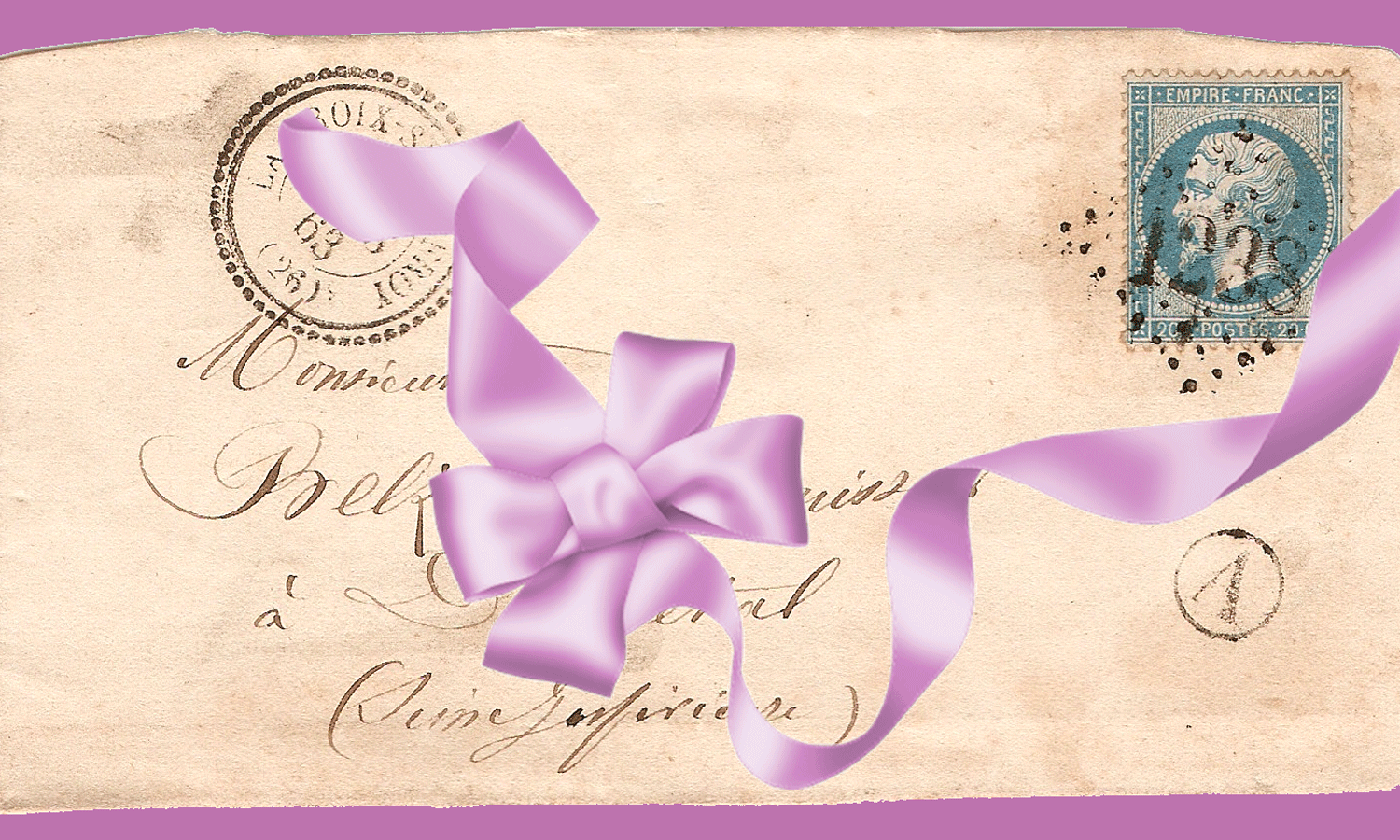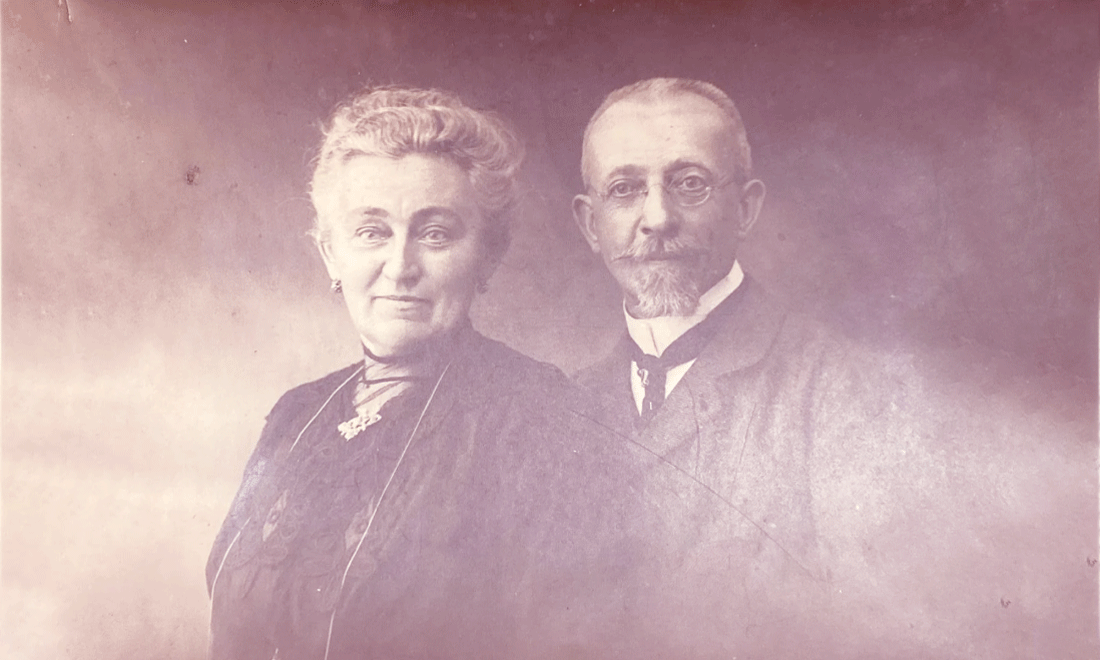
By opening the old mahogany chiffonier, which still bore the discreet smell of withered lilac and yellowed paper, he had not sought to find anything, just to put a little order, as one tries to gather the remains of a dead world. It is there, in a lower drawer, hidden under some family photographs and a peeled missal, that he saw the small bundle.
A sacred secret
Letters. Envelopes lined with a fine, almost trembling handwriting, which he immediately recognized as that of his father, or perhaps of his mother—the two had loved each other so much that their writings, like their souls, had become confused. The ribbon, with a mauve color that had faded over the years, had been tied with a modest application, as if one had wanted to preserve intact the very breath of these murmured confidences.
He stayed there for a long time, standing, his hands trembling, contemplating this vestige of another time. He immediately understood what it was—and especially what it wasn’t. It was not a bequest for anyone to read. It was an offering, a sacred secret. He read nothing. He opened nothing. He felt neither the right nor the heart.
He kept them.
A reliquary
It was more than a memory: a presence. He chooses a shelf in his office—not just any, the one right above where he sat to write, think, dream, maybe pray. He placed them there, the letters, as they were, without touching them further, like placing a reliquary. And it was, for him, as if he were giving his parents a high lookout, a platform of affection suspended between heaven and his own life, now begun towards his own sunset.
He thought, “Somewhere, I come from there.”
And he felt a sweet and serious feeling, like a fidelity to the shadow of an ancient love, which henceforth, in silence, continued to watch.
A patient love
It is only with age, he thought, that one begins to truly understand one’s parents. Not their gestures, nor even their words—all this is too visible, too mixed up with contingencies. But what beat, silent, under their silences. What they had never said and yet had made shine in the smallest things: love.
Not the one, rowdy, that men exchange in juvenile fictions and impulses. A patient love, rooted in duty and discretion. A love that was not said, or so little, but which always knew to be there: in a coat kept ready when it rained, in a vigil without complaint at the bedside of his feverish child, in a voluntary restraint of grief so as not to worry him.
The letters, up there, tied with pale ribbons, became the mute symbol of what he had not seen, understood, or known how to love as he should have, while there was still time. And yet, they didn’t blame him for anything. They were like them: discreet, constant, full of a tenderness that does not demand.

Loyalty
He was now surprised by all that his parents had contained, endured, offered—without ever placing their lives as a burden. They had loved in the calm, in the effacement, in this almost monarchical nobility of those who devote themselves without audience. He had never missed that love, but he hadn’t measured its fullness.
Now that he was alone, or almost alone, with for all his company these letters which he would never read, he realized that he was the fruit of them. Not the heir—because inheritance presupposes an active, sometimes self-interested transmission — but the prolongation, the last growth of a tree planted by other hands, in a fertile land of fidelity.
So he sometimes lifted his eyes, mechanically, towards the shelf. And that look was enough. He no longer needed words. The letters were still there, unchanged, like an ancient love that watches over, silent and standing, at the peak of time.
The eldest
He never really knew how to approach the thing. This kind of truth is not taught, not proclaimed. It settles down. Like a hand resting on another, one evening, without superfluous words. He waited then. May the days be calm, may memory be gentle, may listening come without being called.
It was first with his daughter, the eldest. She had that quiet strength she derived from her mother—a mixture of watchful attention and restrained heart. He showed her the letters one day. Without opening them, without revealing anything of their contents, because he himself knew nothing about them—and wanted to know nothing. He simply placed them on the table, in front of her, in silence.
She looked up at him, silent question in her eyes.
“These are the letters from your grandparents,” he said, almost low. “They have kept themselves all these years. I could have read them, but I didn’t dare. I think they were not intended for me.”
Rare and precious
She understood immediately—as only girls, sometimes, know how to understand these things of the soul. She touched the ribbon with her fingertips, with a silent bow. He looked at her for a moment, then said softly:
“It’s not an inheritance. Nothing to claim. Just a trace. A flame. You also come from there.”
She answered nothing, but she smiled, with a kind of mute promise in her gaze – that of keeping alive, in her own way, this ancient fidelity.
His son, a few days later. Less inclined to intimate things. More secret, more tense too, as if he feared we might slip into pain. He didn’t want to talk to her about the letters right away. He first spoke of his own childhood, of precise memories—a smell of cooking, a car ride with his mother, a rainy evening. Then, almost in passing:
“You know, your grandparents really loved each other. And your mother and I too, despite what the years sometimes veil. It’s not always easy to see when you’re a child. We believe that it’s normal. But this kind of love… it’s rare. And precious.

Dead letters still alive
Her son nodded, a little stiff, but the listening was there. The father added:
“I have nothing to send you about material. Not much in any case. But if I can pass something to you… it’s this idea: you are born of something solid. Not perfect, but faithful. You can rely on it.
He says nothing more. Useless. Words, beyond fair measure, damage. He let them go each with what they could carry. Neither nostalgia, nor weight. Just a kind of new knowledge, almost sweet, almost invisible, but real.
And in his office, every evening, he resumed his place under the shelf, as if under an ancient coat. The letters, up there, had not moved. He liked to think that they were still smiling, in their silence, upon seeing the transmission accomplished, almost in spite of himself.
The intangible
He sometimes, some evenings, stayed there, alone in the golden light of his lamp, hands crossed on his stomach, eyes raised towards the shelf. Not to wait for a revelation, but to listen to what that silence could still tell him. And, little by little, a new thought formed in him—not like a complaint, but like a doubt, a suspicion coming from the depths of time.
He thought of that time, his own now, where everything is written in haste, in brief fits on a cold screen. Chopped sentences, without voices, without ink, without paper. Declarations of love reduced to yellow pictograms, nervous ellipses, promises in 160 characters, immediately erased, immediately replaced. He did not judge. He observed. And deep down, he wondered.
What will remain, one day, of these modern loves?
Nothing to reread, nothing to hold in hand, nothing to tie with a ribbon. Nothing that bears the imprint of a hand leaning over the page, of a hesitation in the curve of a word. No more scribbled margins, no more paper impregnated with the scent of a linen drawer. Love, henceforth, seems to flee from the weight of tangible things.
Need for traces
And he wondered: by dint of telling himself quickly, does he still think to be profound? By dint of showing himself, is he still living in the intimate? It’s not that he doubted the ability of young people to love—no. He knew well that love does not die. But he sensed that he was changing his skin, perhaps his heart. That something, by lightening up, also risked being lost.
He feared a time without memory.
Because love, to last, needs traces. It needs to register somewhere. Not in the immaterial cloud of an anonymous server, but in the matter of the world: a notebook, a letter, a black and white photograph forgotten in a book. It is there that he survives, that he resists wear and tear, that he becomes a witness.
Then, thinking back to his children — to their own loves, already begun, advanced, rough or broken in the invisible of screens—he felt that there was not a concern but a responsibility.
Not to tell them ‘it was better before’. But to gently suggest to them that loving perhaps deserves more than a shift of inches. That some words, if they are really said, deserve to be written. That a love worthy of the name must leave, somewhere, the proof of its passage—even discreet, even fragile.

Without waiting
Like that little package of letters, up there. Handwritten. Read per person. And yet sufficient to attest that, yes, all of this did exist.
And that from there, perhaps, one can still hope.
The idea came to him quietly, like the ideas that really matter: while walking on a morning in April, along a path still soaked with winter. He thought that these letters, up there on the shelf, if they had crossed time, it was not only because of the ribbon, nor the closed drawer, but because they had been written. Posed on the world. Materialized.
So, why not him?
Not to tell about one’s life. Even less so to take stock, this clumsy temptation of men who know themselves to be aging. But simply to say to those who had counted—to those who still counted — something simple. A word of gratitude. A long-worn mute recognition. A fragment of affection, transmitted without expectation of return.
Manuscripts
He thought of his children, of course, and of his kindergarten friend with whom the exchanges had been spaced without quarrel. To another, a lost youth friend, but whose ancient loyalty sometimes returned to him like a forgotten song. To a cousin, to a neighbor, maybe even to this former colleague with whom he had shared much more than work. To a few, a few, no more.
He would not make it a solemn project. Nor a will. Rather, a series of small markers. Bottles in the sea, yes — but which he would take care to entrust not to the uncertain waves, but to the post office. Real letters. Manuscripts. With ink and silence. He imagined it almost as a kind of slow vigil, which would spread over the seasons. Come summer, he would start.
Maybe would he write only three sentences to each. Maybe more to some. It doesn’t matter. What mattered was the gesture. The act of recording, as in the past, what one feels, slowly, with weight, with respect. A way to keep oneself at the height of one’s soul in a world that sometimes seems to float on the surface.
Precious slowness
He thought he would have the time. He wasn’t in a hurry. Age had taught him the value of slow things. But this resolution, silent and simple, rooted itself in him with a new force. He would not wait for the illness, nor the premonition of the end. He would write as long as his hand was firm, as long as his words could still draw a readable curve.
Thus, in his own way, he would pass on the torch. Not as we teach, but as we greet. Not as we remember, but as we thank. One letter at a time. One heart at a time.
And maybe, in twenty years, someone, somewhere, would find one of his letters at the bottom of a drawer. And would look up, like him, at a shelf.

Articles of Alain Aillet


